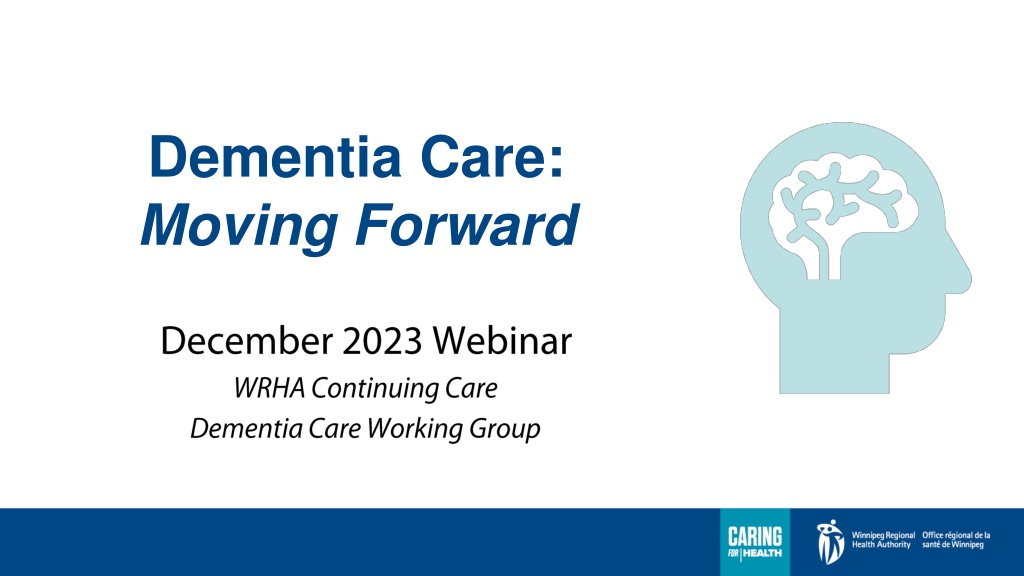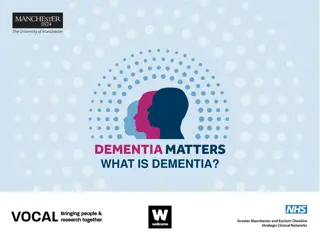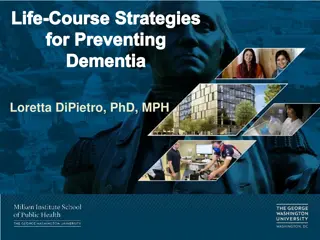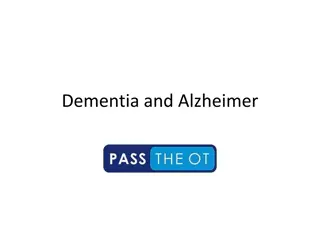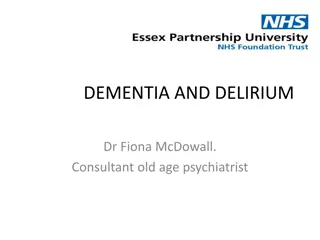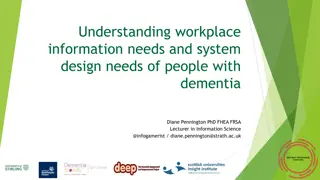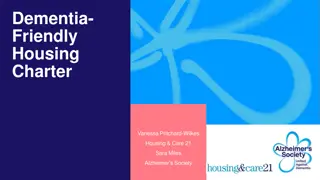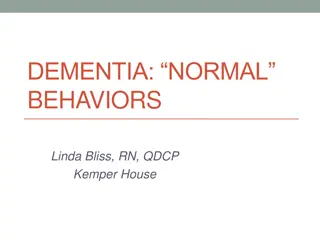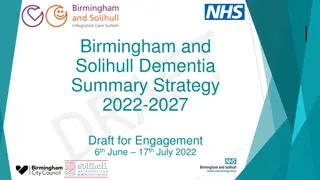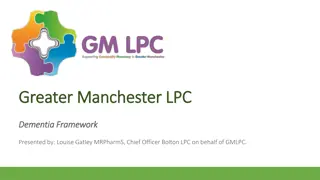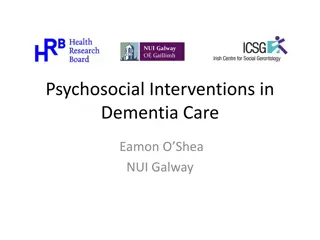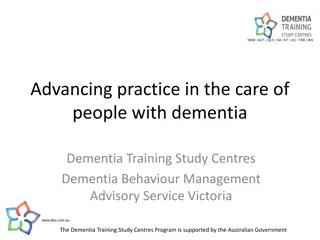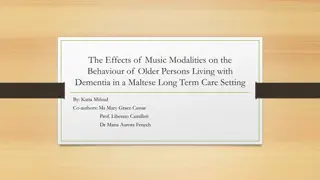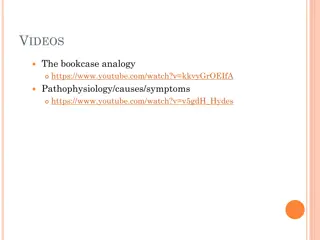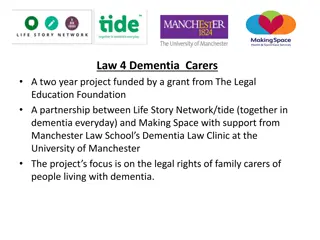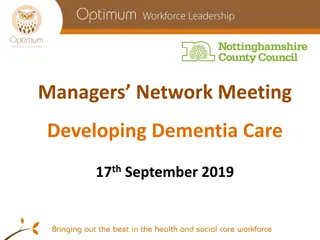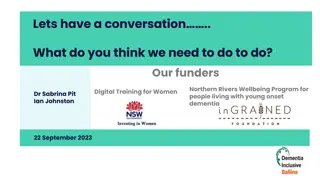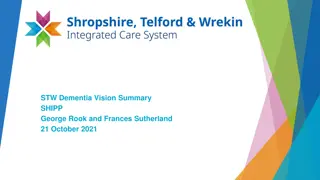Advancements in Dementia Care Education and Resources
Explore the evolution of dementia care education, recent changes, and introduction of new resources. Delve into the importance of such education for residents, families, and staff, highlighting key findings on dementia in long-term care settings. Discover the impact of dementia care education on improving quality of life, reducing risks, enhancing staff confidence, and implementing practical strategies. Uncover key changes implemented in 2019, focusing on integrating knowledge into practice and enhancing professional staff sessions.
Download Presentation

Please find below an Image/Link to download the presentation.
The content on the website is provided AS IS for your information and personal use only. It may not be sold, licensed, or shared on other websites without obtaining consent from the author. Download presentation by click this link. If you encounter any issues during the download, it is possible that the publisher has removed the file from their server.
E N D
Presentation Transcript
Dementia Care: Moving Forward
Purpose of Webinar Provide a brief history and overview of dementia care education to date Discuss recent changes and introduce new dementia care resources Acronym change from P.I.E.C.E.S. Behaviour Assessment (formerly the P.I.E.C.E.S. Quick Reference Guide (formerly the yellow laminate ) Responsive Behaviour Pathways Discuss implementation of the new dementia care resources to C.A.U.S.E. 3 Question Template)
Dementia in Long-Term Care LTC Resident Profile (2015-2016) 87% of residents had a form of cognitive impairment (dementia, stroke, trauma) 69% of residents had dementia % among residents with dementia Characteristics Severe cognitive impairment (Cognitive Performance Scale [CPS] 4) 40% Any responsive behaviours (Aggressive Behaviour Scale [ABS] 1) 50% 31% Signs of depression (Depression Rating Scale [DRS] 3) 82% Dependence in ADLs (Activities of Daily Living Hierarchy Scale 3) Wandered at least once in the last 7 days 21% CIHI: Dementia in long-term care
Why is Dementia Care Education important? Residents & Families Person-centred care and quality of life Reduce risks related to responsive behaviours Reduce risk related to resident- to-resident safety events Staff Build confidence, competence, and resiliency Increased job satisfaction and staff retention Reduce workplace injury to staff Resources Limited availability of specialized supports (e.g. SNU or SNBU beds, constant care)
Dementia Care Education Highlights Creation of: Senior leadership day Family education Resource Person Refresher Day Support Staff day
Key changes made in 2019 Professional staff session reduced to 2 days Increased attendance / greater opportunity for replacement of nurses Revised to support integrating knowledge into practice Used a more hands-on and interactive approach with focus on practical aspects of working with people living with dementia Content included communication approaches/techniques, teamwork, and a person-centred care focus Introduced the Sponsor requirement as part of the registration for Dementia Care Education for professional staff
During the Pandemic In-person education paused Providing Dementia Care During a Pandemic Tip sheets Security guard training Offered 1-day virtual session 2021-2023 Included both professional and support staff Missing the hands on practice No sponsor involvement
What prompted the current changes? P.I.E.C.E.S. no longer exists As a result, any trademarked acronyms, assessment tools and resources are no longer available for use A provincial working group updated the resources and education content to reflect the move away from the P.I.E.C.E.S. framework and replacing it with the new Behavioural Assessment using the C.A.U.S.E. acronym Canada revised their program & contract
Activities Starting in Fall 2023 Return of in-person sessions for: 1-day Support Staff 2-day Professional Staff Introduce and transition from P.I.E.C.E.S. acronym C.A.U.S.E. Incorporate new and revised dementia care resources Reintroduction of the sponsor role and evaluation Promote engagement of residents and families to new
New Dementia Care Resources Behaviour Assessment Quick Reference Guide Responsive Behaviour Pathway
1. What has CHANGED?
What are the RISKS?
What are the possible C.A.U.S.E.s?
What are the possible C.A.U.S.E.s?
What are the possible C.A.U.S.E.s?
What are the possible C.A.U.S.E.s?
What are the possible C.A.U.S.E.s?
What are the possible C.A.U.S.E.s?
Other Tools
4. Plan of Care
4. Plan of Care
Supportive Resources Behavioural Assessment Completion Guide SAMPLE Behavioural Assessment
Responsive Behaviour Pathway Part 1: Interdisciplinary Assessment & Care Planning
Responsive Behaviour Pathway Part 2: Crisis Management
Responsive Behaviour Pathway Part 3: Prescriber Assessment and Medications
Dementia Care Quick Reference Guide Use of Medications for Behavioural and Psychological Symptoms of Dementia (BPSD)
Resident & Family Engagement 4 Infographics with video tips on topics to help caregivers understand dementia and caregiving strategies
Resident & Family Engagement Infographics are a resource for education Admission Care conferences Resident/family meetings to address specific issues Resident/Family Councils Family Education Sessions Family Information Bulletin Boards Raise awareness that dementia care education for staff is ongoing
Resources for Sponsors Handouts Dementia Comparison Table Quick Resource Guide Language and Labels Table Behavioural Assessment and Completion Guide Sponsor Guideline Recorded Tutorial (30 min)
Implementation Educator Resources Template for Dementia Care Binder Suggested Use Document
Implementation Online access to the Dementia Care Resources: Resources for WRHA Long Term Care - WRHA Professionals Under a new Dementia Care heading
Existing Forms Some existing forms may reference P.I.E.C.E.S. be revised as they are reviewed in the future and will Basic Restraint Assessment & Documentation Tool Request for Overcost Funding for Constant Care GMHT PCH Referral
Implementation Timeline PCHs should plan to implement the new behavioural assessment and resources by March 31, 2024 As the new tools and resources are implemented and used in clinical practice, we are interested in your feedback regarding potential revisions Reassessment of resources will occur in 6 months (June 2024)
Dementia Care Education Sessions Jan-Mar 2024 (in-person) Three 2-day sessions for Professional Staff Four 1-day sessions for Support Staff Registration information coming soon Funding is available for staff who are replaced to attend the education sessions
Dementia Care Education Sessions Do staff who participated in the previous dementia education have to retake it? No, people do not have to retake the education in order to learn the new resources. The principles are the same, and the introduction of C.A.U.S.E. and pathways can be done at each PCH Will participants be given a textbook? No, textbooks haven t been given out for a number of years, and there is not a textbook that accompanies the current dementia care education
WRHA Continuing Care Dementia Care Working Group Primary contact: Sheila Smith 204-940-8558 or ssmith32@wrha.mb.ca
